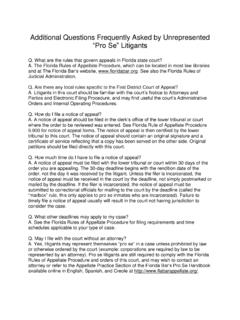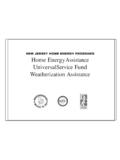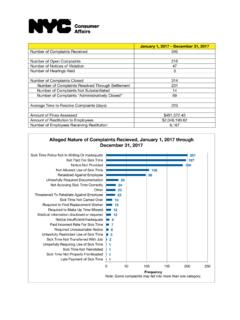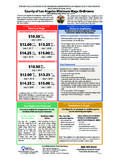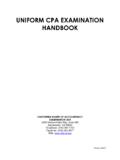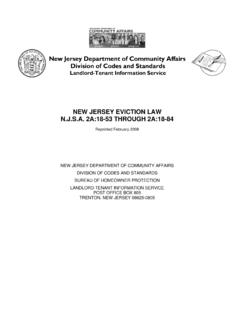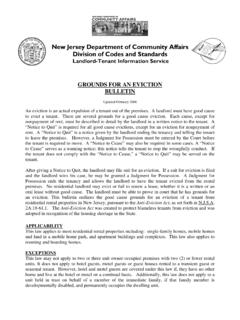Transcription of General Frequently Asked Questions
1 General Frequently Asked Questions : Q. How much is the filing fee for an appeal? A. Unless exempt by law or on the basis of indigency, the filing fee for this court is $ , payable in exact cash, money order, or check. Checks are payable to Jon S. Wheeler, Clerk or First District Court of Appeal. On July 1, 2008, the legislature amended Florida Statute to provide that unless exempt by law or on the basis of indigency, litigants filing cross appeals, notices of joinder, or motions to intervene in an appeal are required to pay a $295 filing fee. The State of Florida and its agencies are exempt by statute from the filing fees. The fee is due at the time the notice of appeal is filed and subsequent action on the appeal, including voluntary dismissal, does not waive the filing fee. Waiver of the filing fee on the basis of indigency in an appeal should be sought from the lower tribunal. Waiver of the filing fee on the basis of indigency in an original petition filed in this court should be sought with this court.
2 Q. What are the hours of the clerk? A. The clerk=s office is open 8:00 to 5:00 (Eastern Time), Monday through Friday, excluding holidays. There is usually a guard on duty from 5:00 until midnight on those days and filings received by the guard after regular business hours are stamped as filed on the day received. However, there is no guarantee the guard will be available on a given day to accept filings, so litigants should ensure that time sensitive matters are filed during regular business hours. Effective August 9, 2010, electronic filings may be made by registered users through the court's online portal, eDCA, at any time, and the date an electronic filing is received by the court through eDCA will constitute the date of filing of that pleading, up to 11:59 Eastern Standard Time on the date the document is electronically filed. Any filing on or after midnight will be deemed to be filed the next business day. Filings on a weekend, a holiday, or any other day the court is closed will be deemed to be filed on the next business day.
3 It is the responsibility of filers to ensure filings are properly submitted to the court through eDCA and that time-sensitive electronic filings are submitted to and received by the court in a timely manner. Q. How many copies of a document must I file? A. All pleadings filed in paper are only required to be filed with an original; no additional copies are required or permitted. Documents filed electronically are not required or permitted to be filed in duplicate paper format. Q. Does the court accept faxed filings? A. Not unless specifically authorized or ordered by the court. Faxed filings must be followed immediately by the filing of a signed original filing with the court. Filings by fax are only accepted with prior court approval and are restricted to exceptional emergency or expedited matters. 1. Q: Does the court accept emailed filings? A. Effective August 9, 2010, registered users are permitted to electronically file all pleadings through eDCA rather than in paper.
4 Documents filed electronically are not required or permitted to be filed in paper format. Effective September 1, 2010, all attorneys and registered users are required to file their documents electronically through eDCA, and the filing of paper pleadings will no longer be authorized. Attorneys must register before they can file electronically through eDCA. All pleadings filed through eDCA must be in PDF format. Q. When do I have to bring envelopes to the court? A. As the court moves toward serving registered eDCA users with all orders, opinions, and mandates via Casemail, the submission of stamped envelopes with motions will no longer be required. Q. Can I review motions, briefs, orders, and other filings in the court file online? A. Documents in a case can be viewed online via the court's secure online portal known as eDCA ( ). Once registering with eDCA and receiving a username and password, attorneys and pro se litigants can access cases in which they are the attorney or party of record.
5 Not all documents in a case will be available electronically on eDCA, but the court will be continuing to make as many documents available electronically in as many cases as possible. As well, the docket for all unrestricted cases and the opinions in all decided cases can be viewed on the court's website. Electronic copies of briefs are now available to attorneys registered in eDCA. even though the attorney is not listed with the court as attorney of record on that case. See this court's website at for more information. Briefs in confidential cases are not available except to the attorneys and parties of record for that case. Not all briefs are available electronically, especially briefs in older cases. Q. How much are photocopies? A. The court is required by Florida Statute sections and to charge $ per page for copies of documents in a case. The court accepts cash (in the exact amount, the clerk=s office cannot make change), money orders, and checks. Certified copies are an additional $ Q.
6 How do I request photocopies? A. If contacting the court by telephone, let the deputy clerk know which document you want a copy of and you will be told how much the copy fee for the document will be and when the copy will be ready to pick up at the court. The deputy clerk may need to check the file and call you back with the information. If contacting the court by mail, specify the case number and document requested and you will be contacted by mail as to the copy fee for the document. Upon receipt of the copy fee, a copy of the requested document will be provided or mailed to you. For attorneys and parties of record in a case, some documents may be available 2. electronically and accessible via the court's secure online portal, eDCA. Registration is required before attorneys or parties can access eDCA. See this court's website at for instructions on how to register with eDCA. Once registered, a user of the system may access those cases in which he or she is the attorney or party of record, including copies of electronic documents, without charge.
7 Attorneys may also access electronic copies of briefs in cases for which they are not attorney of record. Not all documents filed with the court, including briefs, will be available electronically on eDCA in every case. Q. How do I review a file? A. All unrestricted case files are open for viewing to the public. You should contact the clerk=s office prior to the day you wish to view a file so it can be determined whether the file is available. Sometimes active cases are in the process of being reviewed by the court and may not be available for viewing to the public when requested. As well, older closed case files are kept off-site of the court and have to be retrieved by court personnel in advance for viewing. Judicial work product and restricted information is not subject to review by the public. Court files cannot be taken outside the court. Some documents are available to be viewed electronically via the court's secure online portal, eDCA, in cases in which you are an attorney or party of record.
8 Registration is required before users can access their case(s) through eDCA. See this court's website at for instructions on how to register with eDCA. Not all documents filed with the court will be available electronically on eDCA in every case. Q. How can I see a copy of everything that has been filed in a case? A. If you wish to see what documents have been filed in a case, the court=s online docket can be viewed online via the court's website If you wish to request a printed copy of the docket in a case, you may contact the clerk=s office and one will be provided upon payment of the $1-per-page copy fee. Some electronic documents are available electronically via the court's secure online portal, eDCA, in cases in which you are an attorney or party of record. A fee is not required to access those documents from eDCA. Of course, online dockets are not available in restricted cases. Only attorneys and parties in restricted cases are allowed to view the case file or request a printed copy of the case docket for a restricted case.
9 Only attorneys and parties of record in restricted cases may access documents available on eDCA in those cases (after registering with eDCA). Q. Do I need to use a certain color of paper for the cover of my brief? A. No. While the court prefers that briefs contain white cover pages, there is no rule regarding the color of cover pages. Q. How long are case files kept by the court before they are destroyed? A. Florida Rule of Judicial Administration provides for the retention of court 3. records after the case has become final. In this court, files in criminal cases are retained 5 years and files in noncriminal cases are retained 2 years prior to destruction of the court=s file. Once a case has been destroyed, only the dispositive order or opinion and an electronic copy of the docket are retained by the court. All motions, briefs, petitions, etc. are destroyed and are not retained by the court. Of course, all opinions of the court are published in the Southern Third Reporter.
10 Scanned documents uploaded to the court's secure online portal, eDCA, may be available longer. Q. How do I get a copy of an opinion of the court? A. When an opinion is issued, a copy is mailed to all of the parties in the case or their attorneys. Additional copies may be requested at $ per page. However, opinions from January 2003 to the present are available on the court=s website ( ), and all newly issued opinions of the court are published in the Southern Third Reporter, which can be found in most law libraries. An electronic copy of the opinion will also be posted in the case on eDCA. Q. How do I watch oral arguments of the court? A. Most oral arguments of this court are open to the public and can be viewed online on the court's website Some oral arguments are held at locations outside Tallahassee, such as Jacksonville and Pensacola. The oral argument schedule can also be found online on the court's website Copies of the day=s oral argument schedule are usually available with the guard on duty at the court=s entrance but can also be printed offline.

